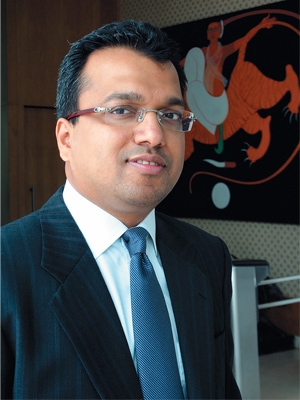
Harsh Agarwal: Indian Firms Can Match Up to MNCs
Emami' s Director tells Forbes India that losing the bid for Paras Pharma is not a setback
Harsh Agarwal
Age: 34 years
Designation: Director, Emami
Education: B.Com, St. Xaviers College, Kolkata
Career: Started in the marketing department at Emami
Interests: Watching movies and reading
In the recent sale of Paras Pharma there was a feeling that the price Reckitt Benckiser paid was high. Emami on the other hand had agreed to pay even more and you persisted with the bid till the very end. Just a few years ago you had acquired Zandu Pharma at a much lower price. How come you were comfortable with agreeing to pay so much?
There are two or three things. If you look at the valuation from the point of view of the sales multiple [Reckitt paid eight times of sales eventually], that is not the right way to look at it. This is because the multiple would be different for different categories like, say, detergents or toothpaste due to, say, the margin or competition in that category.
For us, the multiple is based on what we think we can derive out of that company in terms of extra synergistic benefits or initiatives you can take to improve the company performance by reducing costs, increasing sales and so on. Every acquisition is very different from each other. The circumstances are different, the strengths are different and so we cannot compare one with another.
There is no doubt that the Paras acquisition would have been more expensive than Zandu but there are not a lot of opportunities available in India. It is a question of supply and demand.
Why did the deal go Reckitt Benckiser’s way?
We also don’t know what happened. Obviously, we were surprised as we thought we were a strong contender. We had bid more and so obviously it was a surprise to us. But opportunities will come and it is not that everything is lost for us.
Competition in this space is growing and multinationals have the ability to pay more. What does this mean for an independent entrepreneur-led company in the FMCG space?
The competition is going to increase as several players are looking to inorganic growth and it is not possible to stop that. For us it simply means how competitive we can remain in coming up with innovative ideas. We have to keep cost low without building in a lot of flab into the system. This can be by keeping raw material and packing costs low, cutting on hiring costs, overheads, etc.
I think the future for Indian FMCG companies is bright. I don’t see any reason why they can’t compete with multinationals. We understand Indian market better. They are doing quite well and coming out regularly with new products and innovative concepts. Every company will have its own space as long as they can keep their focus clear.
After news came that Emami would not be acquiring Paras Pharma, Emami stock rose sharply. Is this an indication that the market was not too happy with your intent to acquire Paras?
As management we believe in long-term performance of the company. How the market reacts to certain initiatives is not something we give much importance to, because what we believe is best for the company is what we do.
Sometimes the market reacts based on certain reports without going into details. Sometimes the reaction is based on speculation and rumours. We believe in working on what is best for the long term. We are not in the market as a short-term player.
(This story appears in the 14 January, 2011 issue of Forbes India. To visit our Archives, click here.)
















